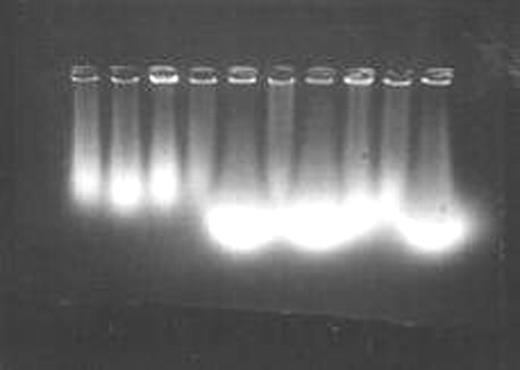Abstract
Background and Objectives:
Thalassemia major patients suffer from severe anemia due to intramedullary hemolysis of erythroid progenitors. Depending on the severity of their disease, thalassemic patients exhibit different patterns of apoptosis. In cases of β-thalassemia major, apoptosis appears to be greatly enhanced in the early-stage erythroid precursors in the bone marrow and it is considered to be the machinery via which ineffective erythropoiesis develops. L-Carnitine is a butyrate derivative found to strongly reduce apoptosis in different diseases. We investigated the effect of oral L-carnitine therapy on apoptosis in thalassemia major patients.
Methods:
eighteen Thalassemia major patients were included. Detection of apoptosis was done by Photometric enzyme immunoassay (Elisa) and agarose gel electrophoresis before and after 6 months oral therapy with L-Carnitine (50mg/kg/day).
Results:
The mean age was 12.2±6.6 years. All patients tolerated L-carnitine with no side effects. A significant decrease of apoptosis rates in the erythroid precursors in the bone marrow of studied cases was noted after therapy by. The enrichment factor measured by the photometric enzyme immunoassay dropped from 3.65±1.338 before therapy to 1.60±0.65 after therapy (p=0.005). A positive ladder pattern reflecting apoptosis on agarose gel electrophoresis was detected in 88.9% of cases prior to treatment (figure 1) versus 11.1% after therapy (figure 2) (p=0.006). Patients also had significant decrease in the frequency of transfusions and increase in the pre-transfusion hemoglobin levels after therapy. These results were found to significantly correlate with the reduction in apoptosis rates (p=0.006, r = 0.543 and p=0.027 &r = −0.7762 respectively).
Conclusion:
Apoptosis plays a major role in the underlying pathophysiology of anemia in thalassemic patients. L-Carnitine seems to be a good modulator of apoptotic processes in such patients leading to decreased rates of programmed erythroblast death and general improvement of the disease condition. Further large-scale studies are needed to evaluate the overall role of L-Carnitine in the management of these patients.
Author notes
Corresponding author



This feature is available to Subscribers Only
Sign In or Create an Account Close Modal